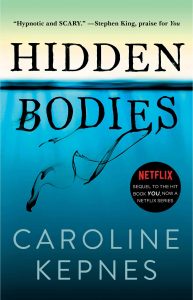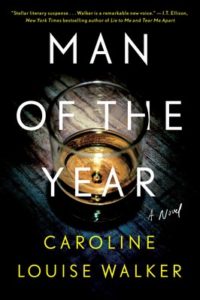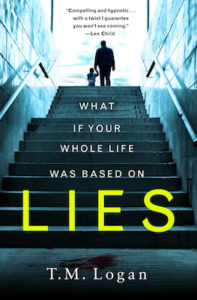It’s a relatively new phenomenon to have the man—aka the villain—narrate psychological thrillers. There are historical examples—In a Lonely Place by Dorothy Hughes comes to mind—but there is something in the flavor of how the contemporary version unfolds. It’s reverse gaslighting: even in the consciousness of a narrator who is manipulating, lying to, subtly abusing the women at the center of these books. And it’s a delicious and difficult feeling to be, for once, on the side of the person manipulating the affair—although quite often the women in these books have more than a passing idea of what’s going on.

Caroline Kepnes, You and Hidden Bodies
Now enjoying a second life as an excellent TV series, Kepnes’s You is achingly spot-on about what hipsters like: crappy bars in Greenpoint, very loud bands, small bookstores, and feeling cooler than everyone else. When every guy type Joe is introduced by his paramour Beck, we can see how ridiculous Beck’s friends are through Joe’s eyes, with their fetishizing of labels and rarity and their enthusiasm for a subset of things only they think are cool (elitism goes hand-and-hand with hipsterism). Believe it or not, Kepnes does her pitch-perfect skewering again in her second Joe book, Hidden Bodies, which finds her hero narrating the delicious details of the crunchier (but still financially comfortable) confines of LA.

Kaira Rouda, Best Day Ever
The narrator of Best Day Ever, Paul Strom, is one of the creepiest protagonists I encountered this year. The novel covers three days in the life of Strom and his wife, Mia, as they travel from their residence in suburban Ohio to their cottage on Lake Erie. Paul promises his wife the best day ever on this trip, but as he narrates their weekend the reader discovers that Paul is not the upright husband, father, and successful ad executive that he pretends to be. He reminisces about his courtship of his wife: “I knew I would do everything in my power to make Mia realize what a catch I was, too. Of course I would succeed, I always do. When you’ve got it, you’ve got it. I’m not bragging, really, I’m just telling you there are some things I’m really good at and this—women—is one of them.” But despite his belief that he has his wife, his sons, and his professional life under control, Paul’s entire existence is going to change over the course of his carefully planned weekend excursion.

Caroline Louise Walker, Man of the Year
Man of the Year is unsurprisingly about a guy named Man of the Year in his small elite town, Sag Harbor (which is Hamptons adjacent). Dr. Robert Hart has such a good life as the novel begins—thriving medical practice, happy second marriage to a trophy wife, partial custody of his son who is finally doing better socially—the reader knows he’s going to destroy himself. But all students of the perverse know, there is voyeuristic and considerable pleasure in watching the machinations of his demise.

T.M. Logan, Lies
Lies starts out fast and never lets up. Devoted dad Joe Lynch is driving his son, William, home one afternoon when the car-obsessed boy calls out that he sees his mom’s car. Since Joe’s wife, Mel, is nowhere near she’s supposed to be, Joe follows her to a hotel, and sees her in a heated conversation with Ben Delaney, who is married to one of Mel’s closest friends. What’s going on with Mel and Ben? Is she having an affair with him, or just an argument, and why did they have to meet at a hotel? Ben can be both vengeful and vindictive. As Joe tries to decipher Mel’s lies, he has to tell a few of his own, but it’s worth it to get to the truth, right?

Araminta Hall, Our Kind of Cruelty
Hall’s blazing debut circles a couple once very much in love (and lust) who have gone their separate ways—except Mike is not exactly over his former girlfriend, Verity. While Mike, heartbroken, moved to New York City to lick his wounds and is now back in London to reunite with Verity, Verity has most definitely moved on. The unstable Mike takes as it as a challenge that she is living with and engaged to someone else. To be in Mike’s head, which is where you spend the novel, is to be deluded and to think about how romantic love is always a delusion, has a touch of folly to it no matter how grounded the lovers.

Samantha Downing, My Lovely Wife
Given the popularity of domestic suspense it’s not surprising that writers are starting to subvert expectations of what the genre can do. To wit, we’ve seen a number of domestic suspense novels told from the male point of view, in which the couple is in cahoots or the woman—or wife–is gaslighting her man. My Lovely Wife takes this premise to an extreme, and it’s a fantastic read. Wife is a stunner of a book. Read at your own peril and pleasure.

















